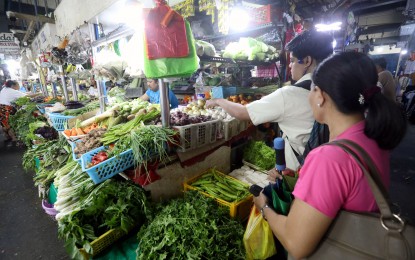
HIGHER PRICES. Headline inflation picks up to 3.7 percent in March this year fron 3.4 percent in February, according to data released Friday (April 5 2024). The government vowed to intensify measures to tame upward price pressures. (PNA file photo)
MANILA – The government will strengthen measures to tame upward price measures amid the El Niño and La Niña challenges, the National Economic and Development Authority (NEDA) said.
NEDA issued the statement after the Philippine Statistics Authority (PSA) reported on Friday that headline inflation increased to 3.7 percent in March from 3.4 percent in February.
The headline inflation during the month, however, was still significantly lower than the 7.6 percent recorded in March last year.
For the first three months of the year, headline inflation settled at 3.3 percent, still within the government's 2 to 4 percent target.
Core inflation, which excludes selected food and energy items, slowed down to 3.4 percent in March 2024 from 3.6 percent in the previous month.
In March 2023, core inflation was higher at 8.0 percent.
In a briefing, National Statistician Dennis Mapa said the uptrend in the headline inflation in March was primarily due to the higher year-on-year increase in the heavily-weighted food and non-alcoholic beverages at 5.6 percent from 4.6 percent in February 2024.
Mapa said food inflation rate in particular picked up to 5.7 percent from 4.8 percent in February 2024.
The increase was influenced by rice inflation, which accelerated to 24.4 percent from 23.7 percent, and meat inflation which went up to 2.0 percent from 0.7 percent.
The food inflation rate was tempered, however, by the slower price increases of eggs and other dairy products (2.3 percent from 3.5 percent), fruits (7.9 percent from 8.7 percent), bread and other cereals (4.6 percent from 5.1 percent), and ready-made food products (4.3 percent from 4.6 percent).
On the other hand, deflation was recorded for fish (-0.9 percent from 0.7 percent), vegetables (-2.5 percent from -11.0 percent), and sugar (-2.9 percent from -2.4 percent).
Non-food inflation, meanwhile, remained stable at 2.4 percent during the month.
The upward trend in the March 2024 inflation rate for transportation, restaurants and accommodation, health, and recreation was also offset by the slower inflation in housing and utilities.
Medium-term inflation path
In a separate statement, the Bangko Sentral ng Pilipinas (BSP) said the March 2024 inflation is within the BSP’s forecast range of 3.4 to 4.2 percent.
"The inflation outturn is consistent with the BSP expectations that inflation will likely remain within the target range in Q1 (first quarter) 2024 due largely to negative base effects," the BSP said.
"However, inflation could temporarily accelerate above the target range in the next two quarters of the year due to the possible adverse impact of adverse weather conditions to domestic agricultural output and positive base effects," it added.
The BSP said risks to the inflation outlook remained tilted toward the upside.
It noted that upside risks to the inflation outlook could emanate from higher transport charges, higher prices of food commodities facing supply constraints, increased electricity rates, higher global oil prices, and implementation of a legislated increase in the minimum wage.
The BSP, however, assured that the Monetary Board will consider the latest inflation outturn in its upcoming monetary policy meeting April 8 and will continue to support the government's non-monetary measures to address supply-side pressures on prices and sustain the disinflation process.
Government measures
NEDA Secretary Arsenio Balisacan, for his part, said the government is closely monitoring weather conditions and their effects on the supply of key commodities, such as food and energy, to protect Filipino households from sudden price increases.
"To ensure sufficient water supply and support our farmers during the dry season, the Department of Environment and Natural Resources has been tasked with monitoring water supply in the country,” Balisacan said. “Simultaneously, the Department of Agriculture is proactively extending assistance to farmers adversely affected by the drought."
Balisacan said preparations for La Niña are already starting.
These measures aim to ensure food and energy security, availability of clean water supply, and public health and safety.
To ease the burden of high electricity prices on vulnerable Filipinos, eligible consumers can receive a 100-percent discount on their monthly bills through the government's Lifeline Rate program.
As of January 2024, 4.9 percent of the 4.6 million beneficiaries of the conditional cash transfer initiative Pantawid Pamilyang Pilipino Program have registered.
"While we continue to face multiple risks, such as potential adjustments in transportation fares, wages, and service utility fees, the Marcos administration is committed to managing the country's inflation,” Balisacan said. “This will be key to sustaining our growth momentum and providing a better life for our countrymen."
Growth target
Meanwhile, Speaker Martin Romualdez said in a statement that the Philippines remains on track to achieve its economic growth target this year, despite the Development Budget Coordination Committee revising the 2024 goal to 6 to 7 percent, down from the previous 6.5 to 7.5 percent.
He said the administration has put in place key economic policies to sustain robust economic growth and enable the country to meet the low end of its gross domestic product target for 2024.
“The economic policies and measures the President and Congress have taken and pursued are keeping us on the right track,” he said. (With a report from Filane Cervantes /PNA)
